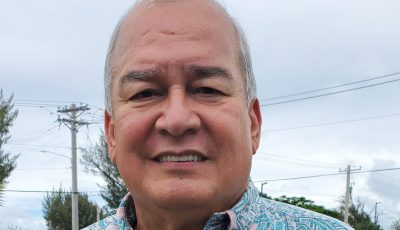$33M food stamp phase-in for NMI in farm bill
The committee vote was 35 to 11.
Delegate Gregorio Kilili C. Sablan (Ind-MP) thanked House Agriculture Committee chair Frank Lucas (R-OK) and Ranking Member Colin Peterson (D-MN) for including the money in the bipartisan farm bill they drafted.
“I am very grateful to Chairman Lucas and Ranking Member Peterson for deciding that it is time to bring the Northern Marianas into the national food stamp program,” said Sablan, who is a member of the Agriculture Committee. “This bipartisan agreement that people in the NMI need higher benefits and a better managed program is something I have worked hard for since being elected to Congress.
“This also means additional federal money coming into our economy to help business and create jobs,” Sablan added.
The “farm bill,” 500-plus pages of legislation governing U.S. agriculture and nutritional assistance policy, is renewed and revised every five years in Congress.
Even though this year’s bill is focused overall on cutting $16.5 billion from the national Supplemental Nutrition Assistance Program, or SNAP, Lucas and Peterson decided to add $33 million for Sablan’s food stamp program.
Study addresses local officials’ worries
The bill the Agriculture Committee voted for yesterday authorizes a study of the capabilities of the Commonwealth government to operate SNAP. The study will also look for alternative program models tailored to the Northern Marianas.
“The Commonwealth government has been very resistant to changing from the current block grant for food stamps to the national program,” Sablan said. “Even though SNAP means increased benefits, more money in the local economy, and higher tax revenues, local officials say they don’t want it. So, what the two-year study will do is look at the reasons for all the resistance.”
Commonwealth officials have expressed concern about who would be eligible, whether there could be an electronic benefits system to prevent fraud, how work requirements could be put in place to avoid becoming a “welfare state,” and what the local share of administrative costs can be.
The U.S. Agriculture Department will conduct the study using $2 million provided in the farm bill.
“All of these concerns will be examined,” Sablan explained. “The result will be recommendations for a pilot program that fits the needs and circumstances of the Northern Marianas.
“Then beginning Oct. 1, 2014, we will have $13.5 million to set up the necessary infrastructure and begin raising benefits. Another $17 million will be available for 2016 and 2017. At that point we can decide what to do next, as a new farm bill is written.”
The goal: raise benefits in the NMI
Sablan has focused on inequities in the food stamp program since he began representing the people of the Northern Marianas in Congress. In Guam, which participates in SNAP, a family of four has monthly benefits of $985. In the Northern Marianas a family of four receives less than half as much, $435 per month.
“I have tried living on the Northern Marianas benefit of about $3.64 per day,” Sablan said. “It’s unhealthy, especially for children whose growing minds and bodies depend on proper nutrition. I think our people should get $8.21 per day like Guam. And if the farm bill becomes law we are going to start moving in that direction.”
Commonwealth officials, who have argued against joining SNAP, are only part of the problem. The Department of Agriculture, too, has expressed its doubt that the Commonwealth can manage SNAP.
“The plan of action that Chairman Lucas and Ranking Member Peterson have included in the farm bill really responds to all party’s concerns,” Sablan said. “The Commonwealth government will have the opportunity to participate in shaping the pilot program. USDA will be assured that the Commonwealth government will be able to handle the new program. And, eventually, the people in the Northern Marianas, who need more help feeding their families, will begin getting the same level of assistance as other Americans enjoy.”
The House Agriculture Committee worked until 1am before approving H.R. 6083, the Federal Agriculture Reform and Risk Management Act of 2012, or FARRM Act.
Many agriculture programs will expire on Sept. 30, making quick passage by the House now a matter of urgency.
The Senate passed its version of the farm bill in June with a bipartisan vote of 65-35. That bill must be merged with the House bill before a final measure can be sent to the President to sign into law.



























